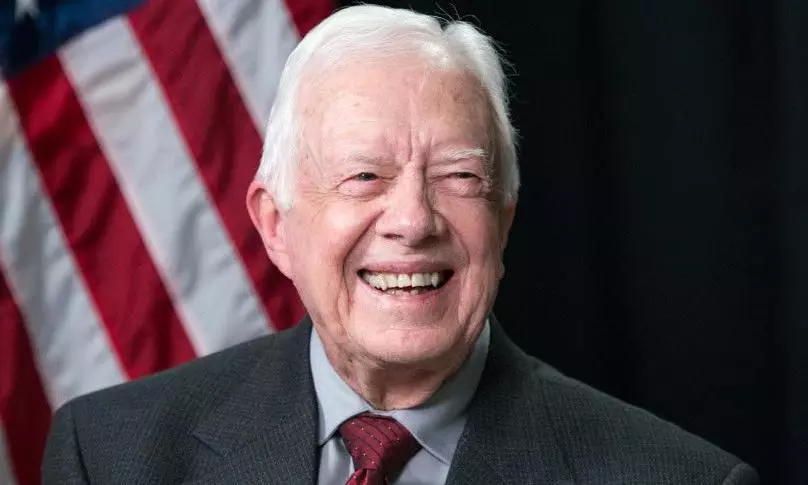
Jimmy Carter dies at 100: Lessons from his presidency for today's geopolitics
Reflecting on Jimmy Carter's presidency, from the Iran hostage crisis to human rights, in the context of today’s geopolitics

Former US President Jimmy Carter, who served from 1977 to 1981, passed away on Sunday (December 29) at the age of 100, leaving behind a legacy of diplomacy, crisis management, and an unwavering commitment to human rights. His tenure offers valuable lessons in leadership during turbulent times, from managing the Iran hostage crisis to brokering the historic Camp David Accords. As the world faces new geopolitical challenges, Carter's approach to leadership and diplomacy remains as relevant as ever. In an interview with The Federal, senior journalist Sridhar Krishnaswamy, who was in the US during Carter's presidency, reflects on his tenure at the White House.
Iran hostage crisis: A defining moment
The Iran hostage crisis, which saw 52 American diplomats and citizens held captive for 444 days, is remembered as a critical test of Carter's presidency. Looking back at the crisis, Krishnaswamy remarked, "The biggest mistake Carter made was admitting the Shah of Iran (Mohammad Reza Pahlavi) into the US for medical treatment." This decision angered Iranians, who believed it symbolised continued US support for Shah's oppressive regime. The crisis not only tarnished Carter's leadership but also shaped US-Iran relations for decades.
Also read: How Trump could answer the Palestinian question
The failed military rescue mission further dented Carter's credibility, with Krishnaswamy noting, "It created a perception of a weak America – unable to secure the release of its own diplomats." Ronald Reagan capitalised on this perception during the 1980 presidential campaign, portraying Carter as ineffective, ultimately contributing to Carter's electoral defeat.
Camp David Accords
One of Carter's most celebrated achievements was the Camp David Accords, which established peace between Egypt and Israel. Krishnaswamy highlighted Carter's role in bringing Egyptian President Anwar Sadat and Israeli Prime Minister Menachem Begin together. "Carter made these two sworn enemies talk, culminating in a historic handshake," he said.
The accords marked a turning point in Middle Eastern politics, demonstrating that dialogue could yield peace. However, Krishnaswamy emphasised that the current geopolitical climate, particularly under leaders like Israel Prime Minister Benjamin Netanyahu and the pro-Israel stance of Donald Trump, complicates the application of the Camp David model today. "The region now needs balanced leadership to navigate conflicts in Gaza, Lebanon, and beyond," he added.
Confronting Soviet aggression
Carter’s presidency coincided with Cold War tensions, particularly the Soviet invasion of Afghanistan in 1979. This led to the Carter Doctrine, which emphasised US military intervention to protect Persian Gulf interests. Krishnaswamy explained, "The Soviets invaded Afghanistan fearing US influence after losing Iran. Carter reacted strongly, but some argue he overreacted without fully understanding the Soviet rationale."
Also read: 'There will be all hell to pay': Trump warns Hamas to release hostages before Jan 20
Drawing parallels to today's challenges, such as the Russia-Ukraine conflict, Krishnaswamy suggested that Carter’s emphasis on dialogue could offer lessons. "Carter would have stressed the need to talk through conflicts – a quality sorely missed in current geopolitics," he said.
Human rights
Carter’s commitment to human rights defined his foreign policy, even when it conflicted with America’s strategic interests. "He was the first president to place human rights at the forefront of US foreign policy," Krishnaswamy noted. However, this approach faced resistance within his administration, with divisions between the Pentagon, the CIA, and other agencies.
Despite these challenges, Carter's advocacy for human rights resonated globally. Even after leaving office, he dedicated himself to humanitarian efforts, often partnering with fellow presidents like George H.W. Bush and Bill Clinton to address crises in Africa. "Carter will always be remembered for his humane approach to foreign policy and his dedication to humanitarian causes," Krishnaswamy added.
Lessons for today’s geopolitics
As the US prepares for a new administration under Donald Trump, Carter’s presidency offers critical lessons. His emphasis on morality in foreign policy, willingness to engage in dialogue, and commitment to peace and human rights stand in stark contrast to the polarised and confrontational approach dominating global politics today.
Krishnaswamy concluded, "Carter’s legacy reminds us of the importance of diplomacy and balanced leadership in addressing the world’s most pressing challenges."
Carter’s life and presidency, marked by moments of triumph and tribulation, remain a testament to the enduring power of ethical and strategic leadership in shaping global geopolitics.
(The content above has been generated using a fine-tuned AI model. To ensure accuracy, quality, and editorial integrity, we employ a Human-In-The-Loop (HITL) process. While AI assists in creating the initial draft, our experienced editorial team carefully reviews, edits, and refines the content before publication. At The Federal, we combine the efficiency of AI with the expertise of human editors to deliver reliable and insightful journalism.)

